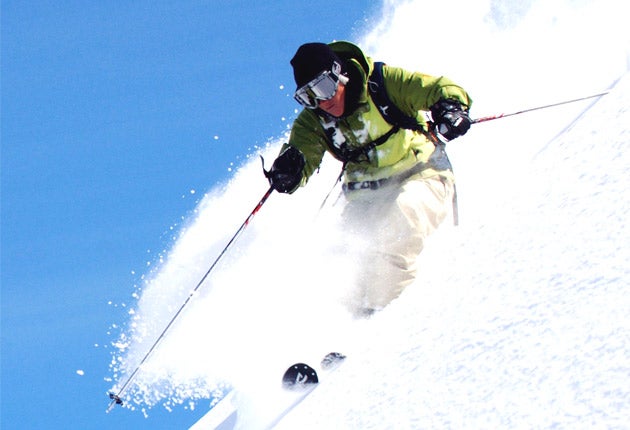Alpine safety chief warns rash tourists: we won't save you any more
Visitors who ignore avalanche warnings risk rescuers' lives, says expert

Your support helps us to tell the story
From reproductive rights to climate change to Big Tech, The Independent is on the ground when the story is developing. Whether it's investigating the financials of Elon Musk's pro-Trump PAC or producing our latest documentary, 'The A Word', which shines a light on the American women fighting for reproductive rights, we know how important it is to parse out the facts from the messaging.
At such a critical moment in US history, we need reporters on the ground. Your donation allows us to keep sending journalists to speak to both sides of the story.
The Independent is trusted by Americans across the entire political spectrum. And unlike many other quality news outlets, we choose not to lock Americans out of our reporting and analysis with paywalls. We believe quality journalism should be available to everyone, paid for by those who can afford it.
Your support makes all the difference.One of Italy's leading mountain rescue experts has warned that his staff may no longer intervene to save foolhardy tourists who put their lives and those of others at risk by ignoring avalanche warnings.
Raffael Kostner, technical director of the Aiut Alpin Dolomites emergency unit, made the comments after another deadly weekend in the Italian Alps, in which three died in giant snow slides after venturing into high-risk areas against official advice.
Mr Kostner, who is regarded as one of the most experienced rescuers working in the Alps, said the time has come to assess incidents on a "case-by-case" basis, and added said that his men may stop coming to the aid of skiers and climbers who flout warnings.
"We can't be expected to die to save those who go off-piste knowing there's a risk," he told a local newspaper. His statement came hours after it emerged that two tourists had died in the Sesto Dolomite mountains in the Alto Adige region of Italy.
Despite warnings that the avalanche risk was high because of heavy snow falls and relatively mild temperatures, the two Italian men, Roberto Laghi, 51, and Andrea Rontini, 35, ventured into unsafe areas on Sunday.
Their bodies were discovered on Monday afternoon, but because of the risk of further snow slides, attempts to retrieve their bodies were delayed until Tuesday. On Sunday, emergency services had recovered the body of a skier who had gone off-piste in the nearby Brenta Dolomite area, when he was struck by an avalanche.
Mr Kostner said he was dismayed by the cavalier attitude taken by some visitors to the mountains. "Last Saturday in the Sarentino Valley, a walker was pulled alive from an avalanche after nearly two hours. He had gone alone, without Arva [the signalling device that enables avalanche victims to be located more easily], and he had entered a dangerous area," said Mr Kostner. "This meant he had endangered not only his own life but those of the people who had to rescue him."
In December, Guido Bertolaso, head of Italy's civil protection unit, demanded tougher measures when four rescue workers died after going to the aid of two tourists who had ignored avalanche warnings to climb in the Dolomites.
Ministers have responded by attempting to rush through an amendment to civil protection law that will enable the courts to hand out jail terms for people found to have triggered deadly snow-slides, and €5,000 (£4,400) fines for those who ignore avalanche warnings and head off-piste.
Senior mountain rescue officials backed Kostner's tough new stance. Fabio Bristot, head of mountain rescue services in the Belluno area of the Veneto Dolomites, told newspaper Corriere della Sera: "I share Kostner's views. Despite our responsibilities and obligations we need to have the strengths sometimes to say 'no' and to evaluate the risks involved in the actual rescue operation."
Adriano Favre, director of the Soccorso Alpino rescue service at Valdostano, said his colleagues faced a difficult dilemma. "We're assuming a heavy responsibility if we say we're not going or that we'll wait." But he added: "We have to draw a line between times when it's absolutely necessary to perform a rescue and times when instead we need the courage to say 'no'."
Join our commenting forum
Join thought-provoking conversations, follow other Independent readers and see their replies
Comments